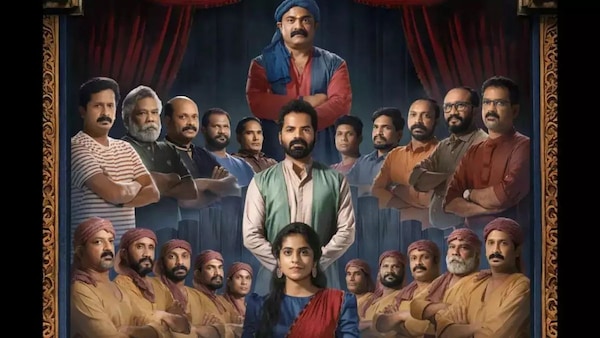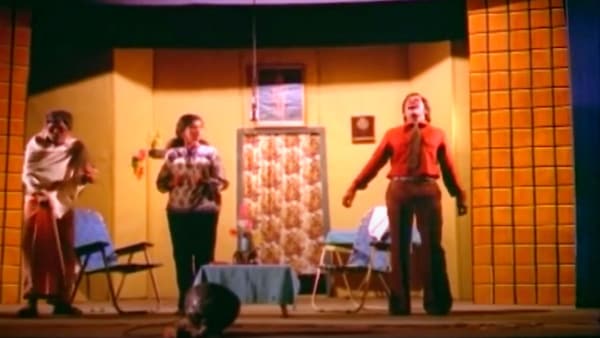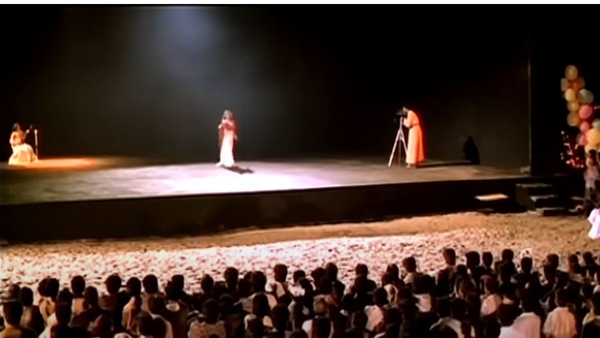With Anand Ekarshi's Aattam, Kerala's Thriving Theatre Culture Gets Its Due Representation In Malayalam Cinema
For a state that has a rich and thriving theatre culture, it is sad that Malayalam cinema never really explored deeply into the history or nuances of the art form. Aattam could be a start.

Last Updated: 02.56 AM, Feb 18, 2024
In Anand Ekarshi’s Aattam, the lone young woman in a 12-member theatre group is molested after a late-night party. And though Anjali (Zarin Shihab) was half asleep and drunk, she is sure he is one of the lead actors of the group. The incident comes to light only the next day when she informs her lover and co-actor (Vinay Fort) in the troupe. Meanwhile, her boyfriend is secretly pleased as he wants to manipulate this situation in his favour to oust the lead actor. Though she would rather not take it any further, perceptive about society’s skeptical lens, he emotionally hijacks her into bringing this issue in front of the members. Here a crime is the catalyst that exposes the integral patriarchy in the group. For the woman, who always felt secure in the group, this is an uncomfortable revelation, that helped her see the wolves behind sheep’s skin. The ones whom she thought had her back were throwing aspersions on her dignity.
Ekarshi stages the court-martial like a performance art, allowing the audience to participate and drift into their world. We are almost provided a live, communal experience as we think, comprehend, and get involved with the character’s predicament. Like in theatre, we seem to be sharing the physical space with the actors. Theatre as a ‘social art form’ is brilliantly used here, especially in the grand finale.
A crime unravels in the backdrop of theatre in KG George’s Yavanika. When their chief drummer goes missing, it leads to an investigation, uncovering the skeletons from the closet. The narrative works more as a police procedural though KG George documents the workings of a theatre company fastidiously, the rigmarole of stage artists, rehearsals, the uncertainties, exploitation, and the economics of it. And one gets the community feeling that embodies a theatre group.

But in Siddique’s Mannar Mathai Speaking, you have a lighter version of a drama company headlined by Mannar Mathai (Innocent). In its prequel, we saw how the elderly Mathaichan’s Urvashi Theatres is almost out of business and he is desperate to reopen it. That’s how he agrees to partner with the madcap heist plans of Balakrishnan (Mukesh) and Gopalakrishnan (Sai Kumar). In the sequel, we are privy to a thriving drama troupe that is in search of a new heroine. But the narrative barely gets into the nitty-gritties of theatre and soon drifts into a thriller.
Bharathan’s Chamayam is set in a fisherman’s village with the central character (Murali) playing a theatre artist. He is running regular plays in the village and is feared and loved by his troupe. A veteran who has mastered the nuances of theatre acting, he is also portrayed as a hard taskmaster. Though considered one of the legendary filmmaker’s weakest works, the narrative still captures the essence of theatre and actors. One of the nicest moments involves the Master discovering his protégé (Manoj K Jayan) in the hero. But unfortunately, Chamayam gets embroiled in needless sub-plots, thereby diluting the core of the story.

Kamal’s Nadan is a frail attempt to explore the deteriorating theatre culture in Kerala. At the centre, you have a theatre actor (Jayaram) who was once the reigning star of a renowned theatre group and is now left on the sidelines owing to the bad choices (adultery) he has made in life. Though there are hints about theatre giving way to more profitable means of entertainment, the narrative soon deviates into a family melodrama.
In Sathyan Anthikad’s Veendum Chila Veetukaryangal which has a middle-class Christian family at the thick of things, theatre is more a means to forge bonds and have fun. Even though the patriarch Kochuthomma (Thilakan) headlines a church-sponsored theatre troupe, theatre is merely coincidental. It’s dealt with in typical Sathyan Anthikad feel-good style, and you barely get to dive into the intricacies of the art form. Except maybe for those occasional exchanges between the dad and the son (Jayaram) about acting and theatre. A similar comic scenario is there in Annan Thambi, which has the hero who is also mute (Mammootty in a double role) being part of a local ballet troupe. And in Daivathinte Swantham Cleetus a middling comedy-drama, though there is this interesting layering of whether you can separate the art from the artist, it is never explored beyond the superficial. Cleetus (Mammootty) is roped in to play Jesus Christ by the priest for his Church play only to realise that the actor has an unscrupulous reputation.
We have had some of the finest actors from the world of theatre in Malayalam cinema. And for a state that has a rich and thriving theatre culture that boasted of several iconic theatre groups, it is sad that Malayalam cinema never really explored deeply into the history or nuances of the art form. Aattam could be a start.

 Premium
Premium